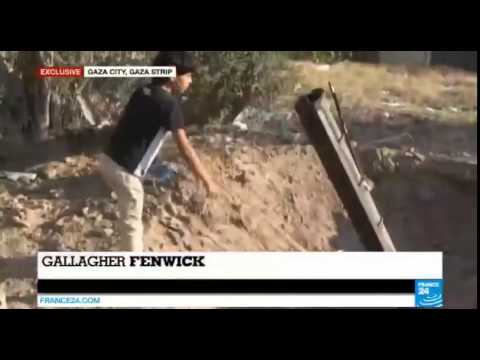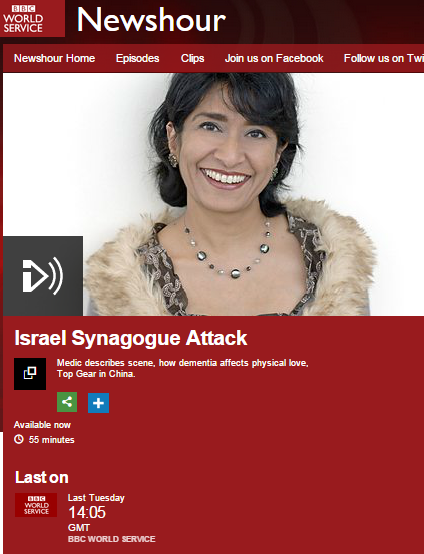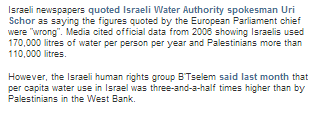A few days ago we discussed part of a response received by a reader from the BBC Complaints department.
Another section of that same response reads as follows:
“…we did raise your concerns with the relevant editorial staff at BBC News who covered the recent conflict in Gaza. They explained that there are number of reasons why BBC News has not shown images or footage of Hamas and Islamic Jihad militants firing rockets. The main reason is that militant groups keep the location of launch sites secret. It was very hard for journalists in Gaza to get to see rockets being fired out, however, during Orla Guerin’s report for the News at Ten on 12 August we reported on allegations that Hamas and other militants put Palestinian civilian lives at risk by operating from residential areas, as well as launching rockets near schools and hospitals. During the aforementioned report Orla Guerin explained that: “During this conflict Palestinian militants have kept a low profile, avoiding the cameras, but we know that at times they have operated from civilian areas.”
The report went on to show an area of ground used by Hamas to launch rockets. It was clearly shown that the site was in very close proximity to apartments inhabited by civilians. The same piece went on to show footage from Indian television, purportedly showing Hamas firing from a residential area near the hotel where the Indian crew were staying.”
The above-mentioned report by Orla Guerin is this one. The BBC Complaints representative notably refrains from pointing out that just prior to the quoted section, Orla Guerin misled BBC audiences by inferring that Hamas’ use of civilian areas as launch sites for missiles is not evidence of its use of human shields.
“While there are growing allegations against Israel, it claims civilians here have been used by militants as human shields but so far there’s been no evidence of that.”
The relevant section of that one report cited by BBC Complaints as showing that the BBC did report on “allegations that Hamas and other militants put Palestinian civilian lives at risk by operating from residential areas, as well as launching rockets near schools and hospitals” makes no mention of schools or hospitals. The specific section is just 44 seconds long and the report appeared thirty-six days into the conflict – by which time the BBC’s narrative was very well entrenched.
As we see, the BBC Complaints department promotes the claim that “militant groups keep the location of launch sites secret” and apparently believes it reasonable to claim that “it was very hard for journalists in Gaza to get to see rockets being fired out” despite the fact that 4,562 missiles were fired throughout the 50 day conflict – an average of over ninety a day.
Notably, the BBC is still obviously unwilling to openly discuss the topic of Hamas intimidation of journalists, although correspondents from other media outlets have been more frank in explaining why audiences worldwide saw so little footage of missiles being fired or terrorists in action, as one Israeli filmmaker described.
“I met today with a Spanish journalist who just came back from Gaza. We talked about the situation there. He was very friendly. I asked him how comes we never see on television channels reporting from Gaza any Hamas people, no gunmen, no rocket launcher, no policemen.. We only see civilians on these reports, mostly women and children. He answered me frankly : “it’s very simple, we did see Hamas people there launching rockets, they were close to our hotel, but if ever we dare pointing our camera on them they would simply shoot at us and kill us.” “
Two days before Guerin’s report was aired, a Norwegian journalist reported:
“There are decent working conditions here, however several foreign journalists have been kicked out from Gaza because Hamas does not like what they have said or written. We have received clear directions that if we see Hamas launching or shooting rockets, we cannot record them. If we do then there will be serious consequences which can lead to expulsion from Gaza. Our fixers, the person that is translating and is helping us around with everything, will also be in grave trouble if we film soldiers from Hamas, especially if they are firing rockets. Apart from that it is fairly OK to work here.”
A CNN reporter stated on camera:
“…we’ve witnessed at least the firing of rockets from this vantage point here. We haven’t seen the actual launcher per-se, but you can see the flash, you can see that it was in between buildings, and you can the thunder as the rockets roar into the air, so clearly you can tell that this is being launched from a populated area.”
Despite these and many other examples, the BBC is still pretending in response to complaints from members of its funding public that the reason it did not report adequately on the actions of terrorists in the Gaza Strip during Operation Protective Edge is that – unlike the staff of other media organisations – its own numerous correspondents on the ground did not see anything to report.
It may of course well be that the BBC’s lack of coverage of missile launches and other terrorist activity in the Gaza Strip was motivated by concern for the personal safety of its correspondents on the ground at the time and its permanent local bureau staff. Whilst that would be perfectly understandable, that policy did however affect the credibility of BBC reporting and had a major effect on its adherence to BBC editorial guidelines concerning accuracy and impartiality, thus affecting the way in which audiences understood the story as a whole.
Such an obvious lack of transparency – and common or garden honesty – in dealing with complaints from the public as shown in the above response clearly compromises the BBC’s reputation in a very serious manner.





